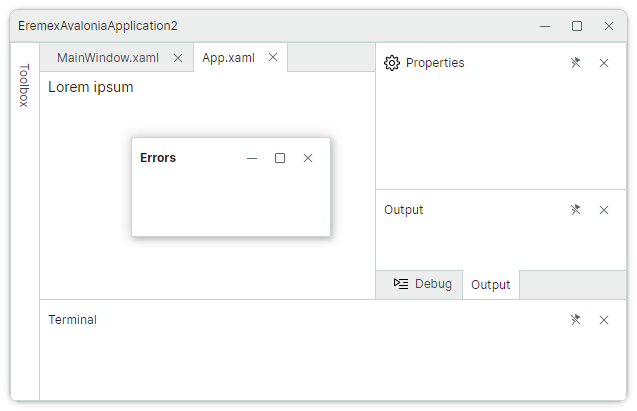How to Create a Complex Docking Layout in Code Behind
This example shows how to create docked, floating and auto-hidden panels in code behind, and arrange them as demonstrated in the image below:

It is assumed that the images used in this example have the Build Action property set to AvaloniaResource.
using Eremex.AvaloniaUI.Controls.Common;
using Eremex.AvaloniaUI.Controls.Docking;
using Eremex.AvaloniaUI.Controls.Utils;
public partial class MainWindow : MxWindow
{
public MainWindow()
{
InitializeComponent();
DockManager dockManager1 = new DockManager();
this.Content = dockManager1;
// Initialize the DockManager's root group.
dockManager1.Root = new DockGroup();
// Create dock panels
DockPane paneProperties = new DockPane()
{
Header = "Properties",
Glyph=ImageLoader.LoadSvgImage(Assembly.GetExecutingAssembly(), "Images/settings.svg"),
GlyphSize=new Avalonia.Size(16,16)
};
DockPane paneDebug = new DockPane()
{
Header = "Debug",
Glyph = ImageLoader.LoadSvgImage(Assembly.GetExecutingAssembly(), "Images/debug2.svg"),
GlyphSize = new Avalonia.Size(16, 16)
};
DockPane paneOutput = new DockPane() { Header = "Output"};
DockPane paneTerminal = new DockPane()
{
Header = "Terminal",
DockHeight = new GridLength(100, GridUnitType.Pixel)
};
// Create a tabbed group for documents
DocumentGroup documentGroup = new DocumentGroup();
// Add the panels to the dock manager
dockManager1.Root.Add(paneProperties);
// Dock the document tabbed group to the left of the 'Properties' panel.
dockManager1.Dock(documentGroup, paneProperties, DockType.Left);
// Dock the 'Debug' panel at the bottom of the 'Properties' panel.
dockManager1.Dock(paneDebug, paneProperties, DockType.Bottom);
// Create a tabbed group from the 'Debug' and 'Output' panels
dockManager1.Dock(paneOutput, paneDebug, DockType.Fill);
// Add documents to the tabbed group
DocumentPane document1 = new DocumentPane() { Header = "MainWindow.xaml" };
DocumentPane document2 = new DocumentPane() { Header = "App.xaml", Content = new TextBlock() { Text = "Lorem ipsum" } };
dockManager1.Dock(document1, documentGroup, DockType.Fill);
dockManager1.Dock(document2, documentGroup, DockType.Fill);
// Display the 'Terminal' panel at the bottom of the root group.
dockManager1.Dock(paneTerminal, dockManager1.Root, DockType.Bottom);
// Set relative size for the 'Properties' panel and the tabbed group (paneDebug.DockParent)
paneProperties.DockHeight = new GridLength(4, GridUnitType.Star);
paneDebug.DockParent.DockHeight = new GridLength(3, GridUnitType.Star);
// Set absolute size for the panel
paneProperties.DockParent.DockWidth = new GridLength(250, GridUnitType.Pixel);
// Create an auto-hide panel
DockPane paneToolbox = new DockPane() { Header = "Toolbox" };
AutoHideGroup autoHideGroup = new AutoHideGroup() { Dock = Dock.Left };
dockManager1.AutoHideGroups.Add(autoHideGroup);
autoHideGroup.Add(paneToolbox);
AutoHideGroup.SetAutoHideWidth(paneToolbox, 150);
// Create a floating panel
DockPane paneErrors = new DockPane() { Header = "Errors" };
dockManager1.Float(paneErrors);
paneErrors.FloatGroup.FloatLocation = new PixelPoint(200, 200);
paneErrors.FloatGroup.FloatWidth = 200;
paneErrors.FloatGroup.FloatHeight = 100;
}
}